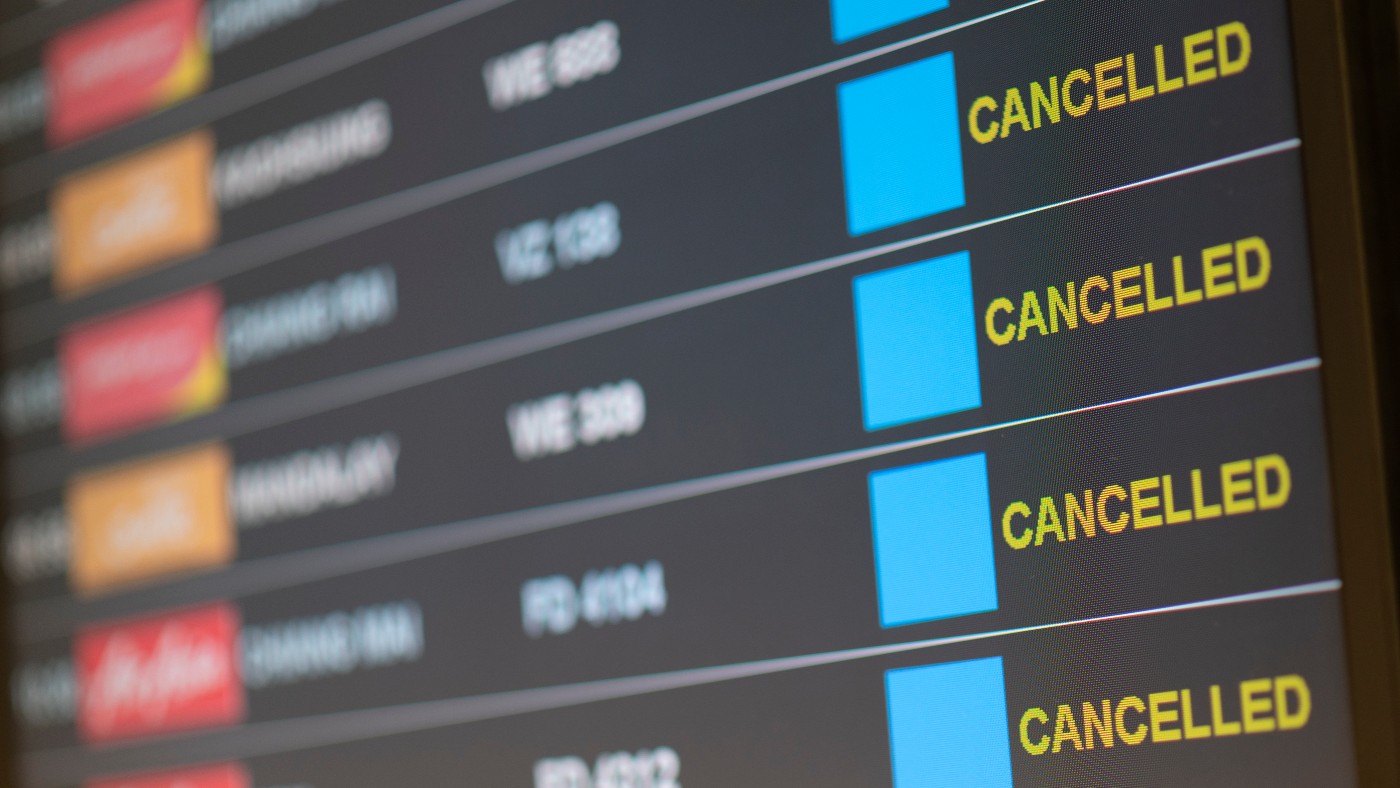Your rights if your summer holiday is cancelled
Refunds, alternative flights or compensation are possible if your travel plans suddenly change

A free daily email with the biggest news stories of the day – and the best features from TheWeek.com
You are now subscribed
Your newsletter sign-up was successful
From wildfires in Rhodes and Corfu to airport staff strikes, families are facing plenty of disruption to their summer holidays this year.
Travel demand “roared back” last summer as pandemic restrictions eased, said BBC News, leading to delays due to staff shortages as airlines and airports hadn’t replaced laid-off workers.
Holidaymakers are facing “different headaches” this year, though, the broadcaster added. Strikes by air traffic control staff in France and industrial action by baggage handlers at London Gatwick are adding to the problems.
The Week
Escape your echo chamber. Get the facts behind the news, plus analysis from multiple perspectives.

Sign up for The Week's Free Newsletters
From our morning news briefing to a weekly Good News Newsletter, get the best of The Week delivered directly to your inbox.
From our morning news briefing to a weekly Good News Newsletter, get the best of The Week delivered directly to your inbox.
Meanwhile, wildfires on the Greek islands of Rhodes and Corfu are “causing chaos” for British holidaymakers and other tourists, said Sky News, with thousands being evacuated and flown home early.
This has raised the issue of what happens if disruption grounds your summer holiday plans.
Your rights if your flight is delayed or cancelled
Passengers have “important legal rights”, explained the Civil Aviation Authority (CAA), when flying to, from or within the UK.
If your flight is cancelled, “regardless of the reason”, the airline must either provide a full refund within seven days or offer an alternative flight, said The Times. You can request a full refund “if the alternative flight isn’t suitable”.
A free daily email with the biggest news stories of the day – and the best features from TheWeek.com
Passengers may also be entitled to compensation “on top of any refund or sweetener” from the airline or tour operator, said MoneyWeek. The amount ranges from £220 per person for short flights up to £520 per passenger for long-haul trips.
However, there are some catches to bear in mind.
You won’t be entitled to compensation if you get more than 14 days’ notice of a cancellation and if the new flight leaves “no more than two hours before the scheduled time of your original flight and arrives less than four hours after the scheduled time of your original flight”, said the CAA.
Delays of more than three hours “can also mean payouts”, said MoneyWeek. Short flights up to 1,500km qualify for payouts of up to £210 per person or up to £340 for mid-haul. If a long-haul flight of more than 3,500km is delayed by three to four hours, holidaymakers can claim up to £250 per passenger, rising to £500 for delays of over four hours.
You are only entitled to compensation where a delay is “usually within the airline’s control, and therefore not an ‘extraordinary circumstance’”, explained MoneySavingExpert. An extraordinary circumstance could be bad weather or air-traffic control or baggage strikes that are deemed outside an airline’s control, the financial website added, but if you don’t agree you can complain to the CAA.
If a flight is delayed by more than two hours on short haul, three hours on medium haul or four hours on long haul, an airline should provide food and drink, said Citizens Advice, as well as “accommodation if you’re delayed overnight”.
This may come as vouchers or you may be asked to provide receipts but airlines will only refund “reasonable” expenses, said Citizens Advice, so you are “unlikely to get money back for alcohol, expensive meals or luxury hotels”.
If you booked through a tour operator or travel company you may need to arrange compensation with them rather than the airline.
Can you get a refund if you don’t want to travel?
This is an issue facing travellers with holidays booked in Rhodes and Corfu.
Travel insurance may usually cover holidaymakers if they can’t travel due to injury, illness or a death in the family. But you could face trouble getting compensation if you just decide you don’t want to fly somewhere, said the Daily Mail, “as the Foreign Office still has not advised people not to travel”.
Rory Boland, travel editor for Which?, told the newspaper: “While there is no official Foreign Office advice against travel to Rhodes, it would be unconscionable for holiday companies to cash in on travellers’ sensible decision not to travel by not refunding or rebooking them.”
Due to a lack of Foreign Office advice, which could force cancellations by deeming these destinations as unsafe for travel, policies have been left to the airlines and tour operators.
EasyJet has cancelled its package holidays to Rhodes until 25 July but is still offering flights to the island. Customers booked to travel to or from Rhodes until 29 July can transfer for free to another date or can request a flight voucher for the value of their unused flights, the airline said.
Jet2, Tui and Thomas Cook have all cancelled package deals to Rhodes and Corfu until the end of the month. Customers will be able to amend bookings or get a refund.
What if you want to end your holiday early?
Airlines and package-holiday operators are arranging repatriation flights for tourists stranded in Rhodes and Corfu or are letting people transfer to earlier flights.
You may normally get support from your insurance company to cover costs of paying for an earlier flight or for unused accommodation but it’s likely this will only be under “limited circumstances”, the Association of British Insurers told Sky News, such as if you or a family member are ill. But “people are advised to check the scope of cover provided by their travel insurance”.
Marc Shoffman is an NCTJ-qualified award-winning freelance journalist, specialising in business, property and personal finance. He has a BA in multimedia journalism from Bournemouth University and a master’s in financial journalism from City University, London. His career began at FT Business trade publication Financial Adviser, during the 2008 banking crash. In 2013, he moved to MailOnline’s personal finance section This is Money, where he covered topics ranging from mortgages and pensions to investments and even a bit of Bitcoin. Since going freelance in 2016, his work has appeared in MoneyWeek, The Times, The Mail on Sunday and on the i news site.
-
 ‘Poor time management isn’t just an inconvenience’
‘Poor time management isn’t just an inconvenience’Instant Opinion Opinion, comment and editorials of the day
-
 Bad Bunny’s Super Bowl: A win for unity
Bad Bunny’s Super Bowl: A win for unityFeature The global superstar's halftime show was a celebration for everyone to enjoy
-
 Book reviews: ‘Bonfire of the Murdochs’ and ‘The Typewriter and the Guillotine’
Book reviews: ‘Bonfire of the Murdochs’ and ‘The Typewriter and the Guillotine’Feature New insights into the Murdoch family’s turmoil and a renowned journalist’s time in pre-World War II Paris
